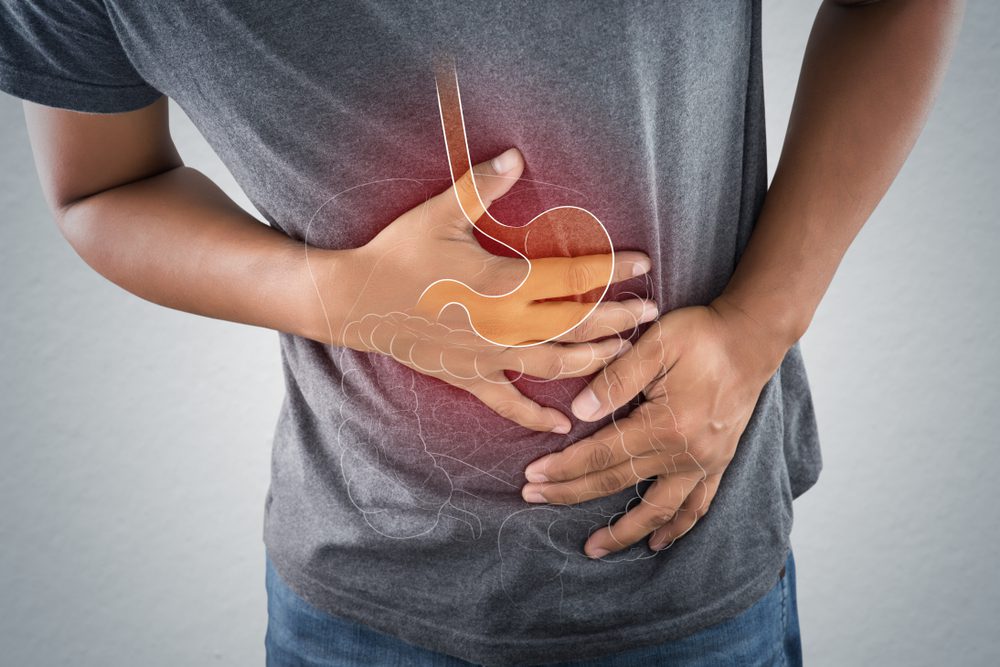Did you know that there are some serious reasons why your stomach hurts all the time?
It’s not uncommon for your stomach to feel a bit off occasionally, maybe after eating a big and delicious meal, indulging in sweets and ice cream if you are lactose intolerant, eating too fast, drinking cold water, and so many other reasons.
However, if you notice that you eat healthily, you have an eating schedule, and you don’t consume things that usually upset your tummy. However, you still experience cramps on a daily basis, there might be something going on in your body.
If you usually feel uncomfortable or gassy, trust me, I’ve been there, and I know how annoying it is. For instance, I’ve had a few problems with my digestive system, but I didn’t have any problems, other than hiccups every time I ate.
I know that I am not the only one who has a sensitive stomach, so I decided to talk to some doctors and find out more about this topic. Without further ado, here are 9 reasons why your stomach hurts all the time.

1. Gastritis
Your stomach contains a liquid that is responsible for helping digest the food. This liquid consists of a lot of acids, which can get through the defensive barrier in your tummy area. Furthermore, these acids can irritate the lining of your stomach and this whole process is called gastritis.
This can happen due to several reasons, such as bacteria, stress, over-consumption of alcohol, or the usage of pain relievers like ibuprofen.
If it’s not very aggravated, you can treat these symptoms with prescription medicines or with an over-the-counter antacid. However, make sure to talk to your doctor, because if you don’t treat this infection when it’s in its first stage, it can lead to bleeding or stomach ulcers.
2. Stomach Virus
The stomach virus is a viral infection that takes place in your intestines and it’s also known by the name stomach flu. You can contract this painful affection from someone who is diagnosed with this, or from eating food that is contaminated.
If you have the stomach flu, you can experience symptoms such as nausea, diarrhea, and cramps, and you might also throw up.
Even though there is no actual treatment for this infection, because it usually goes away naturally, keep in mind that you have to talk to your doctor if you throw up, have a fever, feel extremely dehydrated, or see blood in your stool or vomit.
3. Irritable Bowel Syndrome
When you have irritable bowel syndrome, it means that you have an infection in your large intestine, also known as the colon. This affection can cause several symptoms, such as mucus in your stool, bloating, and cramping.
In addition to that, several studies have discovered that when you are diagnosed with this, you can also experience back-to-back constipation and diarrhea.
Even though doctors don’t have a clear reason why this happens, they think that there are a few factors that might cause it, such as certain foods, hormones, and stress.
4. Food Allergy
A food allergy happens when your body thinks that a certain type of food is dangerous and tries to protect itself from it. If you have this type of infection, you might experience severe stomach aches, and in some serious cases, you can also have both a tingling sensation and swelling in your throat and mouth.
There are a few foods that usually cause food allergies, such as milk, eggs, shellfish, peanuts, nuts, and fish. Make sure to talk to your doctor if you think that your stomach hurts due to certain types of foods.

5. Lactose Intolerance
Milk, yogurt, and cheese are dairy products that contain natural sugars in it, called lactose. In order to properly digest dairy products, your body needs to have a sufficient amount of an enzyme called lactase.
If you don’t have enough of it, your stomach can’t function the way it should, and it can have difficulties breaking it down. As a result, you can experience severe stomach aches, gas, diarrhea, and bloating.
The best way to get rid of all these symptoms is to stay away from dairy products or consume them in smaller doses. Another thing you can do is buy lactose-free dairy products, or use some Lactaid pills.
6. Constipation
If you feel like you are constipated and you want to reduce the uncomfortable feeling, you can try hitting a workout class, drinking plenty of water, and eating foods that are high in fiber, such as whole grains and prunes.
There are people who drink coffee when they are not able to go to the bathroom as they usually do. However, if you decide to consume beverages that are high in caffeine, make sure you don’t overdo it because it might be dangerous for your heart!
If you are one of those people who can’t pass a stool at least three times a week, who has to strain to go, or who has stools that are hard and lumpy, you might be the victim of a serious type of constipation.
This infection puts a lot of pressure on your stomach, so it is always better to talk to your doctor about this!
7. Diverticulitis
There are some little bulging pouches that can form in your digestive system’s lining, usually in the lower part of your colon.
Even though they are quite common and they don’t typically cause any issues, if they get infected or inflamed, they can cause some serious problems, such as stomachache, nausea, and changes in your bowel movement.
If you want a quick fix for this, you can make some changes in your diet or in your overall lifestyle and you should also prioritize rest.
However, if you notice that none of these symptoms have changed, you can talk to your doctor about this problem and they might prescribe you some antibiotics to ease the discomfort.
8. Pancreatitis
The pancreas is an organ that is responsible for helping your body digest the food you eat and all the sugars they contain. When your body is busy with digestion, the pancreas produces pancreatic juices, which are called enzymes.
These substances have the role of breaking down starches, fats, and sugars. In addition to secreting enzymes, your pancreas also helps your digestive system by releasing certain hormones that can be seen as chemical messengers that circulate through your blood.
Pancreatitis is the name of the infection that occurs when your pancreas gets inflamed. If you are diagnosed with this, you might experience pain in your upper belly. In addition to that, this type of discomfort usually gets worse after you eat.
Despite your stomach hurting all the time, you can also throw up or feel nauseous. If you experience any of these symptoms, it might be time to call your doctor and schedule an appointment!

9. Appendicitis
The appendix is a small organ that is in the shape of a finger and it’s found at the beginning of your large intestine, in the lower part of your belly.
Even though we have no clue why we need this little organ, the thing we know is that when it gets inflamed it should be immediately taken out.
If you don’t go to the doctor as soon as possible, your appendix might burst, which will make it spread bacteria throughout your body and be even more dangerous to your life. The pain symptoms usually happen around your belly button and spread down to the right part of your abdomen.
If you feel any type of pain in the area mentioned above, make sure to talk to your doctor, because things can get pretty complicated when it comes to appendicitis!
But for some common stomach issues, we recommend easing the problem with Yogi Tea Stomach Ease from Amazon.
If you liked this article, we have plenty more just like it! Make sure to check this one out as well: 8 Signs You’ve Had Enough Coffee for Today





